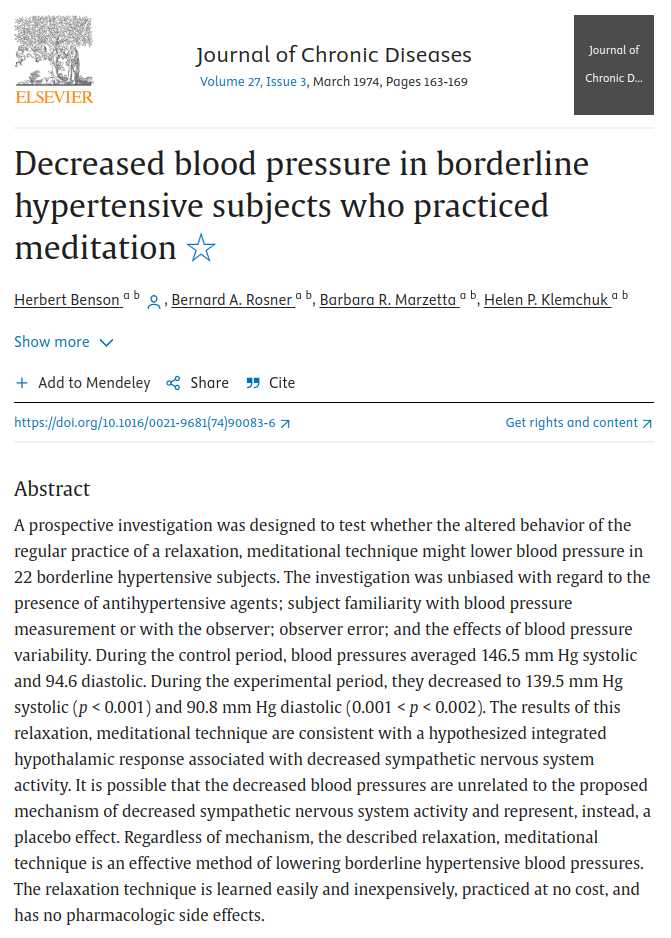Publication
Journal of Chronic Diseases
27(3):163-9
Abstract
A prospective investigation was designed to test whether the altered behavior of the regular practice of a relaxation, meditational technique might lower blood pressure in 22 borderline hypertensive subjects. The investigation was unbiased with regard to the presence of antihypertensive agents; subject familiarity with blood pressure measurement or with the observer; observer error; and the effects of blood pressure variability. During the control period, blood pressures averaged 146.5 mm Hg systolic and 94.6 diastolic. During the experimental period, they decreased to 139.5 mm Hg systolic (p < 0.001) and 90.8 mm Hg diastolic (0.001 < p < 0.002). The results of this relaxation, meditational technique are consistent with a hypothesized integrated hypothalamic response associated with decreased sympathetic nervous system activity. It is possible that the decreased blood pressures are unrelated to the proposed mechanism of decreased sympathetic nervous system activity and represent, instead, a placebo effect. Regardless of mechanism, the described relaxation, meditational technique is an effective method of lowering borderline hypertensive blood pressures. The relaxation technique is learned easily and inexpensively, practiced at no cost, and has no pharmacologic side effects.
Web and Email Links
Related Listings
Journal
Yoga Alliance
About This Workshop 70-90% of all primary care visits in America are related to chronic stress and stress-related illnesses such as anxiety, depression, PTS, heart disease, headaches, GI disruptions, and more. In the next workshop of the Scientific Research series, Yoga Alliance Director of Research, Dr. Sat Bir Singh Khalsa is joined by Dr. John Denninger, Director of Research at the Benson-Henry Institute for Mind Body Medicine at Massachusetts General Hospital and Harvard Universit […]
Journal
Frontiers in Aging Neuroscience
Numerous studies have documented the normal age-related decline of neural structure, function, and cognitive performance. Preliminary evidence suggests that meditation may reduce decline in specific cognitive domains and in brain structure. Here we extended this research by investigating the relation between age and fluid intelligence and resting state brain functional network architecture using graph theory, in middle-aged yoga and meditation practitioners, and matched controls. Flui […]
Journal
International Journal of Cardiology
We report extremely prominent heart rate oscillations associated with slow breathing during specific traditional forms of Chinese Chi and Kundalini Yoga meditation techniques in healthy young adults. We applied both spectral analysis and a novel analytic technique based on the Hilbert transform to quantify these heart rate dynamics. The amplitude of these oscillations during meditation was significantly greater than in the pre-meditation control state and also in three non-meditation […]

